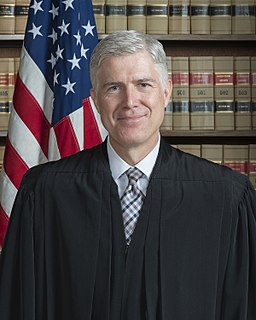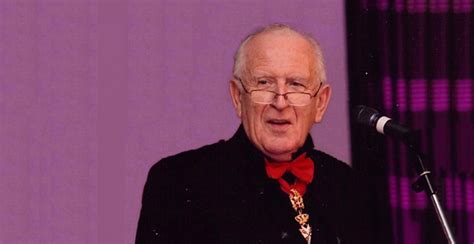A Quote by Neil Gorsuch
Practicing in the trial work trenches of the law, I saw, too, that when we judges don our robes, it doesn't make us any smarter, but it does serve as a reminder of what's expected of us: Impartiality and independence, collegiality and courage.
Related Quotes
None of us like the concept of law because none of us like the restraints it puts on us. But when we understand that God has given us his law to aid us in guarding our souls, we see that the law is for our fulfillment, not for our limitation. The law reminds us that some things, some experiences, some relationships are sacred. When everything has been profaned, it is not just my freedom that has been lost- the loss is everyone's. God gave us the law to remind us of the sacredness of life, and our created legal systems only serve to remind us of the profane judgments we make.
Of course fear does not automatically lead to courage. Injury does not necessarily lead to insight. Hardship will not automatically make us better. Pain can break us or make us wiser. Suffering can destroy us or make us stronger. Fear can cripple us, or it can make us more courageous. It is resilience that makes the difference.
I know that God loves us. He allows us to exercise our moral agency even when we misuse it. He permits us to make our own decisions. Christ cannot help us if we do not trust Him; He cannot teach us if we do not serve Him. He will not force us to do what's right, but He will show us the way only when we decide to serve Him. Certainly, for us to serve in His kingdom, Christ requires that we experience a change of thought and attitude.
That's why we have appellate judges that are more than one judge because each of us, from our life experiences, will more easily see different perspectives argued by parties. But judges do consider all of the arguments of litigants. I have. Most of my opinions, if not all of them, explain to parties by the law requires what it does.
I'd go to conference after conference and it would essentially be the talking points. Either pro or con. It's amazing how polarized the tech conversation is. There's also this neurological fixation, the incessant wondering what the Internet's doing to our brain: "Does it make us stupid, does it make us distracted?" And then the other guys say, "No, it's making us smarter than ever, and better than ever, and more connected." And it's like, where is the economic and social context? Why is that rarely considered?
More than by fear of going astray, my hope is that we will be moved by the fear of remaining shut up within structures which give us a false sense of security, within rules which make us harsh judges, within habits which make us feel safe, while at our door people are starving and Jesus does not tire of saying to us: 'Give them something to eat.'

































